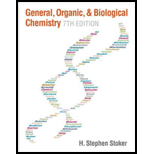
Concept explainers
(a)
Interpretation:
Substituted ammonium ion has to be named.
Concept Introduction:
IUPAC rules for naming ammonium ions:
There are two rules that has to be followed while naming a positive ion (ammonium ion) and they are,
- In order to name an ammonium salt from alkylamine, the ending of the name
amine is changed from amine to ammonium ion. - In order to name an
aromatic amine, the ending of the name “-e” is replaced by “-ium ion”.
(b)
Interpretation:
Substituted ammonium ion has to be named.
Concept Introduction:
IUPAC rules for naming ammonium ions:
There are two rules that has to be followed while naming a positive ion (ammonium ion) and they are,
- In order to name an ammonium salt from alkylamine, the ending of the name amine is changed from amine to ammonium ion.
- In order to name an aromatic amine, the ending of the name “-e” is replaced by “-ium ion”.
(c)
Interpretation:
Substituted anilinium ion has to be named.
Concept Introduction:
IUPAC rules for naming ammonium ions:
There are two rules that has to be followed while naming a positive ion (ammonium ion) and they are,
- In order to name an ammonium salt from alkylamine, the ending of the name amine is changed from amine to ammonium ion.
- In order to name an aromatic amine, the ending of the name “-e” is replaced by “-ium ion”.
(d)
Interpretation:
Substituted anilinium ion has to be named.
Concept Introduction:
IUPAC rules for naming ammonium ions:
There are two rules that has to be followed while naming a positive ion (ammonium ion) and they are,
- In order to name an ammonium salt from alkylamine, the ending of the name amine is changed from amine to ammonium ion.
- In order to name an aromatic amine, the ending of the name “-e” is replaced by “-ium ion”.
Want to see the full answer?
Check out a sample textbook solution
Chapter 17 Solutions
General, Organic, and Biological Chemistry
- Give a definition and an example for each class of organic compounds.(1) aldehyde (2) aromatic hydrocarbon (3) carboxylic acid(4) ester (5) amine (6) amide(7) nitrilearrow_forwardExplain why carboxylic acids have higher boiling points than other compounds with OH groups?arrow_forwardAn anhydride is an organic molecule derived from two carboxylic acids. What are these two acids for the molecule in the picture? i. Two butanoic acidii. One octanoic acidiii. Butanoic acid + propanoic acidiv. Acetic acid + butanoic acidarrow_forward
- What are Nitriles?arrow_forwardWhat are carboxylic acid? What is its general formula? What are the properties of carboxylic acid? What are the steps in the IUPAC and common naming of carboxylic acid? Draw 5 condensed structures of carboxylic acid and write their IUPAC name (do not include those in the video. What are the uses of carboxylic acid? Cite examples.arrow_forwardFor embalming purposes, phenol has the properties of preserving, disinfecting, and ___ . cauterizing cut tissues adding a pink glow to the body adding a nice fragrance anticoagulantarrow_forward
 Chemistry for Today: General, Organic, and Bioche...ChemistryISBN:9781305960060Author:Spencer L. Seager, Michael R. Slabaugh, Maren S. HansenPublisher:Cengage Learning
Chemistry for Today: General, Organic, and Bioche...ChemistryISBN:9781305960060Author:Spencer L. Seager, Michael R. Slabaugh, Maren S. HansenPublisher:Cengage Learning General, Organic, and Biological ChemistryChemistryISBN:9781285853918Author:H. Stephen StokerPublisher:Cengage Learning
General, Organic, and Biological ChemistryChemistryISBN:9781285853918Author:H. Stephen StokerPublisher:Cengage Learning Organic And Biological ChemistryChemistryISBN:9781305081079Author:STOKER, H. Stephen (howard Stephen)Publisher:Cengage Learning,
Organic And Biological ChemistryChemistryISBN:9781305081079Author:STOKER, H. Stephen (howard Stephen)Publisher:Cengage Learning, World of Chemistry, 3rd editionChemistryISBN:9781133109655Author:Steven S. Zumdahl, Susan L. Zumdahl, Donald J. DeCostePublisher:Brooks / Cole / Cengage Learning
World of Chemistry, 3rd editionChemistryISBN:9781133109655Author:Steven S. Zumdahl, Susan L. Zumdahl, Donald J. DeCostePublisher:Brooks / Cole / Cengage Learning Introductory Chemistry: A FoundationChemistryISBN:9781337399425Author:Steven S. Zumdahl, Donald J. DeCostePublisher:Cengage Learning
Introductory Chemistry: A FoundationChemistryISBN:9781337399425Author:Steven S. Zumdahl, Donald J. DeCostePublisher:Cengage Learning




